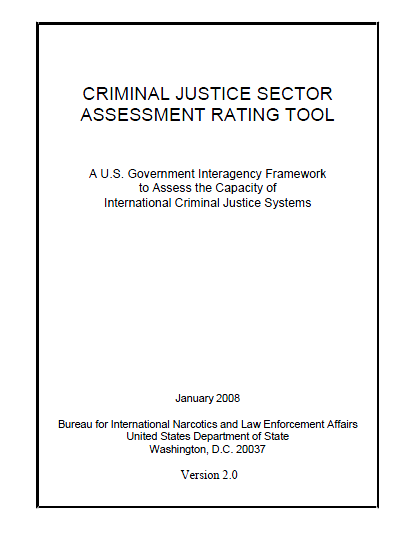CRIMINAL JUSTICE SECTOR ASSESSMENT RATING TOOL: A U.S. Government Interagency Framework to Assess the Capacity of International Criminal Justice Systems
- Bureau for International Narcotics and Law Enforcement Affairs, United States Department of State
- 65 pages
- January 2008
The events of September 11, 2001 demonstrated the direct and lethal threat posed to U.S. national security by a state that openly exploits its dearth of democratic processes and lack of legitimate rule of law. Recognition of the serious threat posed by states that previously were thought largely incapable of directly harming the United States has required a substantial examination of, and alteration in, national security strategy.
As the U.S. government adjusts tactics for fighting the long war against terror and other transnational crime threats, effective tools are needed to systematically expand the use of “soft power” to assist and develop fledgling nations’ rule of law institutions. There is growing recognition of the high correlation between effective criminal justice systems in democratic nations and their ability to be reliable, long-term international partners for peace, stability, and prosperity.
U.S. assistance in Afghanistan and Iraq has underpinned the need for a whole of government paradigm to promote rule of law. The United States Government (USG) now spends billions of dollars each year on rule of law assistance programs. A fundamental and vital component of rule of law development is instituting a vigorous and impartial criminal justice sector. Proficiency in how to effectively use and measure this foreign assistance, however, continues to develop accompanied by the requirement to organize complex efforts into transferable knowledge for all of USG policy makers and implementers.
The Criminal Justice Sector Assessment Rating Tool (CJSART) is designed to assist policy makers and program managers to prioritize and administer host-nation criminal justice sectors needing assistance. Once the assistance programs are underway, the CJSART is a systematic tool designed to measure progress and accomplishments against standardized benchmarks. Used in its entirety, the CJSART holistically examines a country’s laws, judicial institutions, law enforcement organizations, border security, and corrections systems as well as a country’s adherence to international rule of law standards such as bilateral and multilateral treaties.
Policy makers have long understood the end-state goals of lowering crime rates and providing access to justice, but the intermediate steps toward reaching those goals were not well defined. The CJSART is the first USG attempt to comprehensively identify the crucial components of a healthy criminal justice system, assess them, and create a framework for improving rule of law over the long term. The CJSART can be used to increase efficiency, conserve finite foreign assistance resources, and help to ensure that our efforts are cost-effective and transparent. The components CJSART captures of healthy systems are international principles, not U.S. practices. The framework in this tool takes into consideration those components universally necessary for democratic rule of law, while remaining sensitive to the customs, traditions, and social structures of the world’s myriad forms of democracy and their individual levels of development.
This Criminal Justice Sector Evaluation focuses its efforts on a subset of the security sector: criminal justice systems. For the purposes of this framework, a criminal justice system is comprised of the following elements:
• Laws – A nation’s Criminal Code and Criminal Procedure Code;
• Judicial Institutions –Judges, the Public Prosecution Service, and the Defense Bar (including both private attorneys and public defenders);
• Law Enforcement – Policing, investigations, and forensics;
• Border Security – Points of entry, Customs, and Security, whether land, marine, or air;
• Corrections System – Prison system and detention facilities, both pre and post conviction confinement; and
• International Cooperation – Treaties relevant to criminal justice to which a nation is a signatory and membership/participation in conventions, agreements and international organizations.Standardizing these six components allows for progress to be tracked over time. Prior to CJSART, the status of a country’s criminal justice system was often determined through consideration of an ad hoc, often expedient, assortment of considerations or via the personal expertise of individual program managers. Because the collection of factors considered was not consistent, or always reflective of USG assistance priorities, it was often not possible to affirm definitively when progress was made within s state’s a criminal justice system. CJSART, therefore, attempts to advance the field’s ability to reliably and systematically evaluate criminal justice sector assistance.

